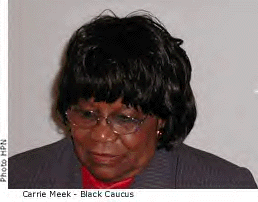

| Want to send this page or a link to a friend? Click on mail at the top of this window. |
| First published February 25, 2002 |
| In a failed state like Haiti, where terrorists and drug |
| dealers rule, does democracy have a chance? |
| _________ |
| By YVES A. ISIDOR |
Cambridge, Massachusetts - Visits by foreign dignitaries or officials of human rights groups to Haiti are not usually in the troubled Caribbean nation=s radical leftist and totalitarian dictator Jean-Bertrand Aristide=s best interest.
But beginning with the orderly queue of visiting dignitaries and officials that was formed this week inside the Haitian national palace, the office of Haiti=s democratic opposition, better known as the Convergence Democratique (CD), the office of the Caribbean nation=s Center for Human Rights and Democracy (CHRD), including the Haitian Chamber of Commerce=s (HCC), is to, in part, communicate to you, the reader of this column, who the prominent visitors were, and the organizations and governments, if any, they each represented.
 |
|
 |
| The visiting dignitaries - From left United States Congresswoman Carrie Meek (D-FL), Congressman John Conyers (D-MI), in suit, were afforded the opportunity to, at first, shake hands with radical and de facto President Jean-Bertrand Aristide and democratic opposition leaders. so, too, did they do the same with senior officials of Haiti's Center for Human Rights and Democracy and directors of the nation's chamber of commerce. |
Consider, too, New York State Democratic governatorial challenger, Mr. Andrew Cuomo and his wife Kerry Kennedy-Cuomo. They only met with tyrant Aristide, a man who is known for his fiery sermons during his tenure as a Roman Catholic priest of the shantytowns. Also, for his habitudes of urging chimères, or thugs-for-hire, from the worst slums of the capital Port-au-Prince, to burn political opponents alive, including subjecting their offices to be consumed by flames.
Perhaps, in a sense of gratitude to Mr. Cuomo=s brother-in-laws, former United States Congressman Joseph P. Kennedy II, who contributed decisively to his return to Haiti from exile in Washington, D.C., in 1994, Aristide urged Haitian-American New Yorkers to vote for him.
Yet visiting officials from the respected Inter-American Commission on Human Rights (IACHR), an arm of the Organization of the American States (OAS), conversed with all parties involved in the long Haitian political crisis.
But why members of the International Republican Institute (IRI) visiting delegation categorically refused to meet with Aristide? Why treating only Aristide, a man whose vocabulary about politics uses phrases like Aone day, we Haitians, will have our own Sandinistas= revolution,@ a reference to the 1979 Nicaraguan revolution that obliterated the Somoza=s dynasty and brought Daniel Ortega to power, and Athe international community, especially the U.S., is engaged in economic terrorism against Haiti,@ like a hoodlum, as did Robert Ménard, the Secretary-General of Reporters Without Borders, in November of last year?
IRI,@ according to its Web site, www.org, Ais not a part of the Republican Party of the United States. Its programs adhere to fundamental American principles such as liberty, rule of law, and entrepreneurial spirit that fosters economic development outside of the United States.@
The argument of the action clearly provides some answers. The first step is to read, say, Awe, visiting officials from the International Republican Institute, are not content with the present state of affairs in Haiti.@ Translation: Not your de facto government based on democratic principles, but on political repression, cynical, not idealistic.
Thus, not does your government proclaim a peaceful intent, yet it is preparing for more terror, and has been for years, as the brutal killing of Haiti=s best known radio journalist and commentator, Jean Léopold Dominique, in the early morning of April 3, 2000, in the courtyard of his Radio Haiti-Inter station, suggests.
|
 |
With the hacking to death with machetes of radio journalist, Brignol Lindor, in broad daylight, on December 3, 2001, by then-Deputy Mayor Dumé Bony and criminals of the peasant organization, Domi Nan Bwa (Sleeping in the Woods), which thereafter claimed to be affiliated with your Lavalas Family Party, after he was ferociously pulled from his automobile in the l'Acul neighborhood, near the provincial city of Petit-Goâve, you reminded advocates of democracy and human rights that the caravan of death was still around and so will it be for a long time.
The death threats your chimères, or thugs, continue to utter against journalists and freedom fighters, causing a great many of them to flee the country for their lives, further confirm so.
The argument of the action goes further. AIt would be wrong and immorally acceptable for we, the visiting members of the International Republican Institute, to meet with you, Aristide. In such a statement, the surface is closely examined to reveal that doing so would be like adding insult to injury.
And the significant number of Haitian citizens who have yet to attain justice and suffering relieved for the brutal killings of their love ones by you Aristide and members of your criminal syndicate, which is comprised mainly of thieves, murders, drug dealers and racketeers, would feel betrayed. Sadly so would that be, they would certainly discontinue their quest for justice and cease to seek to emulate the democratic transformation of many former totalitarian nations to help Haiti achieves democracy.
However, how does one explain the the plethora of visiting dignitaries and officials, to be precise in just a matter of a few days, in a Caribbean nation that brutal dictator Aristide has turned into a truly awful place for most Haitians to live in, with widespread dehumanizing poverty - more than 80 percent of Haiti=s estimated 7.8m inhabitants endure daily abject poverty?
But before I proceed to provide an answer to the first half of the question that I rhetorically ask myself, it=s work to further address the gross incompetence the de facto government of Aristide is known for and the culture of corruption fostered by Aristide himself.
The de facto government has certainly failed to design policies which, in turn, would help address many of the nation=s social ills. About 85 percent of Haiti=s citizens are illiterate. Infant and maternal mortality rates are among the highest in the world.
The statistics themselves cannot convey the dimension of HIV-AIDS in the country since many citizens, mainly those living in rural areas, are too poor to pay for the cost (economic) of a visit at the nearest doctor=s office or hospital. Often, a great many of them assume that their illness is caused by a voodoo curse put on them by a neighbor. But one thing is for sure the latest number of HIV-AIDS cases surpasses 400,000, and sadly so for an estimated population of only 7.8m.
The recent purchase of at least four distinctive properties and estates, all in Haiti, at an estimated total cost (economic) of U.S.$7m; the acquisition of an innumerable number of expansive late model automobiles; the sum of U.S.$9 million to pay for the cost of his family of four security; and, more than U.S.$4 spent on lobbying in Washington, D.C., hoping to convince the Bush Administration that he is no longer a chief bandit, a firebrand, clearly show that he, Aristide, is corrupted absolutely. That he has ravaged the country. More precisely so, the never-healthy economy.
The gross incompetence of the Aristide de facto government, including growing narcotics trafficking (more than 14 percent of narcotics sold in the U.S. enters the country via Haiti mainly from the northwest South American nation of Columbia), makes it hard for the majority of Haitian families, who continue to languish without electricity, running water and garbage collection, to dream of a better quality of life, but perpetual despair for their progenies.
And for the tiny financial elite, or feudal class, the constant kidnapping of its members, a booming underground industry, has allowed members of tyrant Aristide=s Lavalas Family political party the amassing of great fortunes.
At first, the answer, is free from political interpretations, as I=m now answering the first half of the question first asked. The visiting dignitaries and officials were all in Haiti on a fact-finding mission. They gathered information relevant to a series of extrajudicial killings of journalists and democratic opposition members. So, too, they collected relevant information about the constant illegal arrests of democratic opposition activists and leaders, including the burning to the ground of freedom fighters= political offices and private residences recently - all by Aristide=s chimères, or thugs.
What=s more? The visiting dignitaries and officials inquired about the May 2000 largely fraudulent elections and, in turn, obtained damaging relevant information, accusing totalitarian dictator Aristide of masterminding a Agrand electoral fraud,@ from the neighborhood to the Haitian national palace.
Still, for tyrant Aristide, it was not bizarre at all, as it seemed for others, to include the belief of many that he has long been trafficking in narcotics, and this by proxy, to manage to enlist the support of Mr. Conyers, Ms. Meek, in addition to that of Mr. Cuomo, to put a respectable face on his totalitarian government. This, was not without a reason. Aristide=s de facto government was and will most likely continue to suffer from a disreputable image, both at home and abroad.
Both Mr. Conyers and Mr. Cuomo thereafter reasoned: AThe United States should resume its long suspended financial assistance to Haiti. The United States should cease to veto international aid loans, including millions of dollars from the Inter-American Bank of Development (IABD), that are intended for the Caribbean nation,@ they added, and a joint view that reflected the sentiments of Ms. Meek, who also said "a climate of security must be achieved in Haiti, suggesting that law and order must be one of the first priorities."
Their reasoning, in part, is tough to swallow. Haiti (the Aristide=s de facto government) is not in a transition from the dictatorship of the proletariat, first instituted by Aristide in 1991, as they seemed to reflect, to a free and democratic state. Unfortunately, now, it is, instead, something Haitians have never seen: AA matured dictatorship of the proletariat.@
This, in fact, was the view shared by United States Secretary of State, Collin Powell, early this month when he addressed the 14-nation Caribbean Community, or CARICOM, in Nassau, Bahamas.
We will fork over the money to Haiti long after we determine there is democracy, there is real progress there,@ said Secretary Powell who recalled his role along with former President Jimmy Carter and then-Senator Sam Nunn in brokering the agreement that paved the way for tyrant Aristide to return to Haiti and reoccupy the Haitian national palace in 1994, and this, after nearly three years in exile, first in Venezuela, ultimately in Washington, D.C.
Sure Secretary Powell had a few more unpleasant words for the dictator. "We are terribly concerned about the political unrest that continues to haunt Haiti." "
"We are concerned about the government, and we do not believe enough has been done yet to move the political process forward," Secretary Powell further told the tyrant.
The concerns voiced by Secretary Powell automatically put an end to the efforts of Caribbean leaders who attempted to successfully lobby the Secretary of State for the resumption of aid to the dirt poor nation that is Haiti. An odd kind of lobbying for a government, through its unacceptable behavior, and a man, whose anti-democratic temperament, have long helped convinced the whole world that together they are nothing more than a Atableau of crimes.
Secretary Powell=s concerns did not seem far from the European Union=s. The European Union, again, recently told the dictator, Alook, to make the case for a check, first you have to cease to be a gross human rights perpetrator and ardently promote democracy.
Sure brutal dictator Aristide continues to have a problem proving that he is a new person, one who is capable of helping Haiti achieves democracy. There is a reason, among many others, for so. Citizens continue to be taken out of the circulation without a warrant. Since it is so, may I, too, say with great fanfares: Not even a dime should be given to the tyrant by policy makers who hold the strings at international financial institutions.
What else and immediately needs to be done to not simply cajole the brutal dictator to conform his behavior? No more baby-sitting. Now it is time for the international community, including the United States, to adopt more coercive measures against Aristide and members of his de facto government.@ These are my additional recommendations, and so will they, hopefully, prove beneficial to the cause of democracy in Haiti. In other words, helping to consign the tyrannical rule that has claimed so many victims to the archives of history.
Yves A. Isidor teaches economics at the University of Massachusetts-Dartmouth and is the spokesperson for We Haitians United We Stand For Democracy, a Cambridge, MA-based nonpartisan political pressure group.
| Wehaitians, the scholarly journal of democracy and human rights |
| More from wehaitians.com |